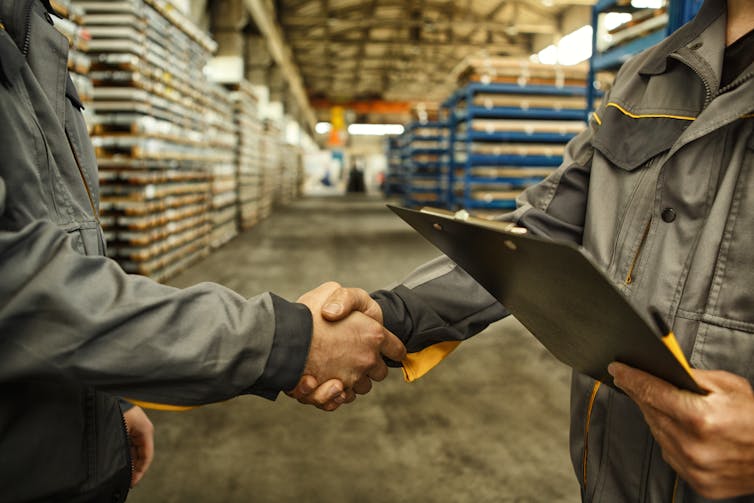The competition watchdog wants to help businesses work together on sustainability – but it’s forgotten a key part
- Written by The Conversation

When businesses work together – for whatever reason – they run the risk of breaching the competition laws enforced by our national watchdog, the Australian Competition and Consumer Commission (ACCC).
These laws aim to prevent anti-competitive practices that can hurt Australian consumers, like cartel behaviour and misuse of market power.
But businesses can also team up for all the right reasons, such as making their operations and supply chains more sustainable. Done right, this benefits society as a whole and should be encouraged.
Last month, to help businesses navigate this tricky terrain, the ACCC published a draft guide on sustainability collaborations. A finalised version is expected later this year.
This aims to empower businesses thinking about working together on projects with environmental goals, such as reducing greenhouse gas emissions, improving water systems and reducing their waste.
But with a sole focus on the environment, it seems to have worryingly overlooked the social elements of sustainability – people, equity and communities. Here’s why that’s a problem.
Read more: What is sustainability accounting? What does ESG mean? We have answers
A step in the right direction
The ACCC’s draft guide aims to help businesses understand whether a project is likely to breach competition law, and how they can get an exemption if a risk of breach exists.
On announcing it, acting chair Mick Keogh highlighted the need for such legal protections:
Our intention in developing this guide is to make it clear competition law should not be seen as an immovable obstacle for collaboration on sustainability that can have a public benefit.
So where might businesses currently run into trouble?
Imagine two competing businesses with shared environmental concerns agreeing to only source environmentally friendly products from a specific supplier.
This could simply reflect the fact this particular supplier was the only one engaging in environmental best practices. However, such a collaboration could arguably amount to cartel behaviour if it restricted the amount or type of goods these businesses came to offer.
Under the new ACCC guidelines, these competing businesses could seek an exemption by demonstrating their collaboration reflected a positive environmental effort.
Sustainability is about more than just the environment
Such legal protections for businesses hoping to work together on environmental goals are an important step forward. But in its efforts, the ACCC seems to have overlooked an important aspect of sustainability – its social dimension.
Key social goals for business collaborations could include respecting human rights or fighting modern slavery.
But modifying our earlier example slightly, two competing businesses could agree to only purchase goods from certain suppliers with certified anti-slavery conditions – or to avoid suppliers known to engage in modern slavery.
This would have clear social benefits, but would not be protected under the approach currently proposed by the ACCC.
Sadly, this oversight reflects a broader trend in sustainability discourse.
Sustainability has a long history. In 1987, it was defined by the United Nations Brundtland Commission as “meeting the needs of the present without compromising the ability of future generations to meet their own needs”.
It is represented by three pillars: economic, social and environmental, or less formally, profit, people and planet.
But research has found the social pillar is the weakest when it comes to sustainable development.
Much of this comes down to difficulty in measurement, which can see it excluded from metrics and policies. Current accounting systems are better prepared to track and measure environmental and economic data.
We can’t ignore the social pillar
In a submission to consultation on the draft guidelines, NSW Anti-slavery Commissioner James Cockayne argued the oversight would “almost certainly chill – or perhaps freeze – numerous responsible business conduct collaborations that are already under way”.
Getting the social pillar right is also vital to achieving environmental sustainability.
It’s not that Australia hasn’t been making progress on the social elements of sustainability. Legislation introduced in 2018 made it mandatory for certain organisations to report modern slavery risks in their supply chains.
Australia’s National Sustainable Development Strategy and the country’s adherence to International Labour Organization conventions also show our commitment to an integrated approach.
But more work is needed. Expanding the ACCC’s definition of sustainability would be one such step.







